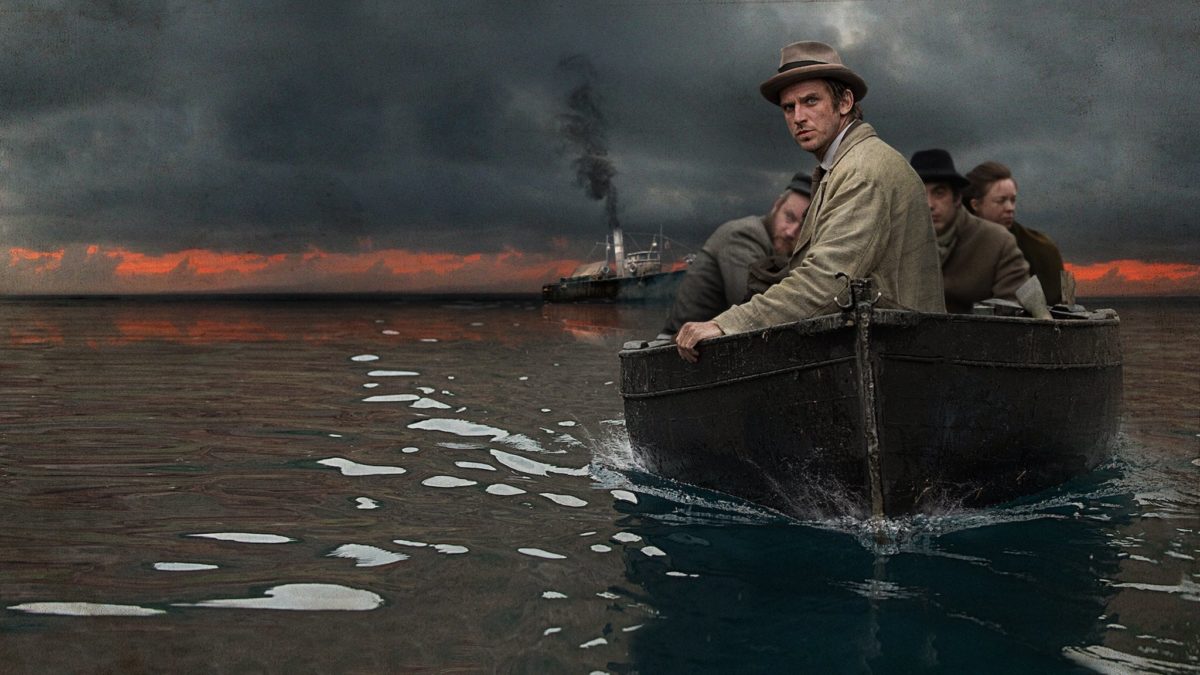The wicker manifesto
(FULL SPOILERS FOLLOW)
One thing that becomes clear when examining the full arc of Gareth Evans’s career, from Footsteps onward, is that at his core he doesn’t conceive of himself as an “action guy.” Compared to directors like, say, Isaac Florentine, who was the proprietor of a karate dojo in Israel before he got into the film industry, or Chad Stahelski, who was a stuntman before he ever stepped behind a camera, Evans’s journey to the director’s chair started with him being a movie buff; someone with a deep appreciation for genre films of all stripes, and the various ways that shots could be strung together to get a jolt out of the audience. It was through a fortuitous series of life circumstances that he came to be known as a vital, pioneering new voice in martial-arts action, but his God-given talents aren’t really anything to do with martial arts per se. What makes him stand out as an authorial voice is his facility with the second-to-second ebb and flow of anticipation and catharsis; of guiding the audience’s expectations towards one outcome, and then blindsiding them with something just to the left of those expectations. Think of moments like the clothes-pole in Merantau, or the balcony-rail kill in The Raid, or the baseball-bat death in The Raid 2. They’re the most memorable moments in his films; these split-second moments of violent, cathartic release that hit the viewer like a taser charge, that work so well for how they combine visual elements set up in advance, in thrilling, surprising ways.
Evans is a once-in-a-generation wunderkind when it comes to staging these kinds of “punchlines,” as he calls them, and it’s clearly a transferable skill. The jump from extreme action to extreme horror is a natural enough one to think to make, and he made it successfully once before: Safe Haven, the anthology segment he co-created for V/H/S/2 with Timo Tjahjanto, is a straight blast of gnarly, grody imagery to the adrenal gland. At half an hour, it’s long for an anthology segment, but never feels it; one after another, the punchlines keep coming, finding new ways to ratchet up the intensity still further without pausing for breath, a Grand Guignol haunted house ride with the momentum of a freight train.
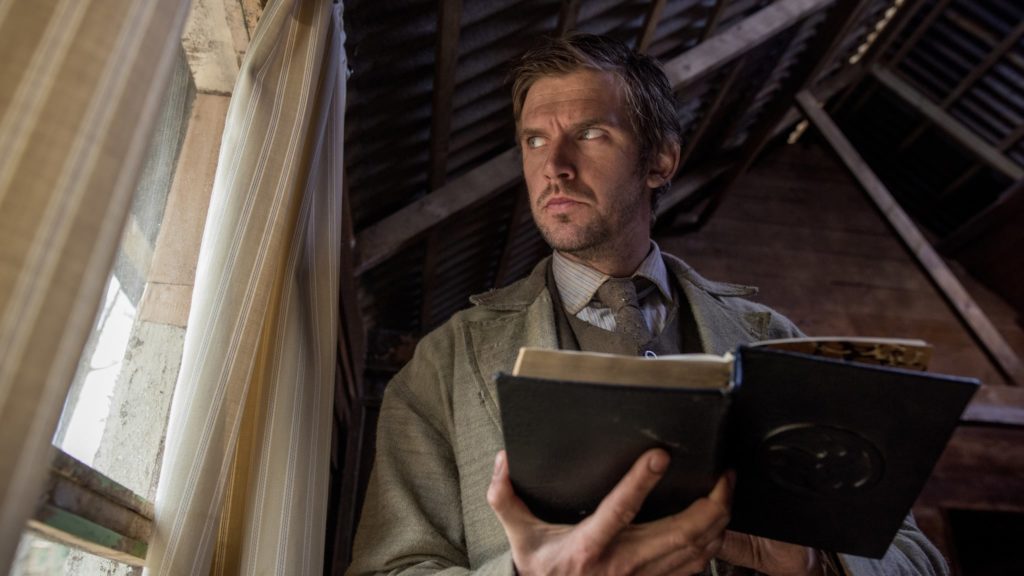
The other side of the coin, though, is that when your process as a writer and a director focuses on winding up and blowing up these moments of catharsis, these spikes on the audience’s line graph, it results in movies that are very… “literal,” I suppose you might say. The stakes in Gareth Evans movies are always very immediate and physical. The dynamics that exist between characters are always very sharply defined; very definite; very mechanistic. Input motivation; output behaviour. This is a useful mode in a movie like, say, for instance, The Raid 2, where there are like two-dozen named characters and seven different factions tangled together in gangland warfare. It’s less helpful, though, in a context where characters’ motivations are required to be ambivalent and mysterious, or where there are forces at work that the audience isn’t meant to grasp. Like, say, for instance, a folk horror movie.
The stakes in Gareth Evans movies are always very immediate and physical. The dynamics that exist between characters are always very sharply defined; very definite; very mechanistic.
In a scene near the end of Apostle, there’s a very illuminating line of dialogue given by Quinn (Mark Lewis Jones), who describes the witchy crone-entity who provides his cult’s barren island with fertile soil in exchange for human blood thusly: “She’s no god. She’s just a machine. You feed her, and she… delivers.” It’s probably not intended to be a line illustrative of Evans’s approach to storytelling, but the God/Machine dichotomy it sets up fascinates me. It speaks to me of a filmmaker who wants to move into themes more abstract and metaphysical and numinous than he’d ever dealt with before, and struggling to reconcile that mission with his instincts as a blunt, purposeful storyteller, who’s all about intensity and force.
I get the sense that when Evans moved back to Wales from Indonesia, he was interested in drawing a line between his 2009-14 output with Merantau Films, although what shape the new phase of his career would take wasn’t yet clear. For a brief moment, it looked like he would be incorporated into the comic book blockbuster machine right at the moment its box-office draw was reaching its zenith; similar to directors of small, offbeat indie films like Taika Waititi, or Gareth Edwards, or Anna Boden and Ryan Fleck. That door apparently slammed shut shortly after it opened; after the abject failure of the 2017 cut of Justice League, Warner Bros. underwent one of the strategic reorientations they apparently go through every 18 months, and the proposed Deathstroke movie was lost in the shuffle.

In the absence of that move into the Hollywood studio-movie big-time, Evans found himself floundering – in his own words, “desperate to do something different from The Raid.” Apostle was the outcome of that creative itch – Evans teamed up with producer Aram Tertzakian of XYZ Films, and together they secured funding from Netflix, right at the height of the era when they were throwing money at any project that tickled their fancy (I wasn’t able to find concrete information on the film’s budget, but it certainly looks well-heeled for an indie horror film, production values about on par with what you might expect from a prestige HBO TV show). It premiered at Fantastic Fest in September 2018 to a generally solid if not quite glowing critical reception, and released on streaming three weeks later, where it remains sequestered.
(Naturally, this means it’s unaccompanied by any of the bonus features you’d get on any half-decent home video release – no BTS footage, no cast and crew interviews, no commentary tracks, the sort of things I leaned on when I was researching the previous entries in this retrospective. If I may get on my soapbox for a moment: the proliferation of streaming has had its pros and cons in the past decade for filmmakers and audiences, but I’d argue that one absolutely unequivocal ill to come out of it is the erosion of bonus features as part of a curated experience for fans who’re actually engaged and interested in what they’re watching, rather than just throwing on Red Notice on a Friday evening to distract themselves from their existential dread for another couple of hours.)
It’s perhaps not a passion project to the extent The Raid 2 was, born as it was out of a need to make something, rather than to make this thing, specifically. But it’s still a very recognisably personal project that emerges from his brain and his particular creative process. Once again, we’re in a pastiche of the kind of genre films he liked growing up – this time, he’s riffing on the horror films of the early 70’s, in particular The Texas Chain Saw Massacre, Witchfinder General, and, it goes without saying, The Wicker Man – but spruced up with bits of specificity and idiosyncratic details that prevent it from feeling too much like a pale tribute act. Once again, as in The Raid, we have the story of a man infiltrating a dangerous enemy compound in order to retrieve their sibling. Once again, this plays out as a series of set-pieces, organised around slowly accumulating tension and climactic eruptions of spectacular, gory violence (though the emphasis is reversed, here, with much more time and emphasis spent on the wind-ups than the pay-offs).
Once again, we’re in a pastiche of the kind of genre films [Evans] liked growing up – this time, he’s riffing on the horror films of the early 70’s
The film is a period piece, set in 1905. The story centres on Thomas Richardson (Dan Stevens), a son of an aristocratic family and former priest, a victim of the Christian purges in turn-of-the-century China, whose torture at the hands of the Boxers led him to abandon his faith and become addicted to laudanum. He returns home from exile at the behest of his family when his sister Jennifer (Elen Rhys) is kidnapped and ransomed by a cult established by political dissidents on a remote Welsh island. The cult, maybe a couple of hundred devotees led by the self-styled Prophet Malcolm (Michael Sheen) and his two lieutenants Quinn and Frank (Paul Higgins) are scratching out a living as subsistence farmers, and have recently fallen on hard times. They’re fending off assassins sent by the British Crown; their crops are dying and their livestock are miscarrying; the influence of their local patron deity (the aforementioned creepy witchy crone lady) seems to be wearing off despite their regular donations of blood. The money they’re poised to make from the ransom, they hope, will turn things around, but the Richardson family have the bright idea to send Thomas – believed to be dead by the world at large – to pose as a member of Malcolm’s flock and find Jennifer himself before paying the ransom.
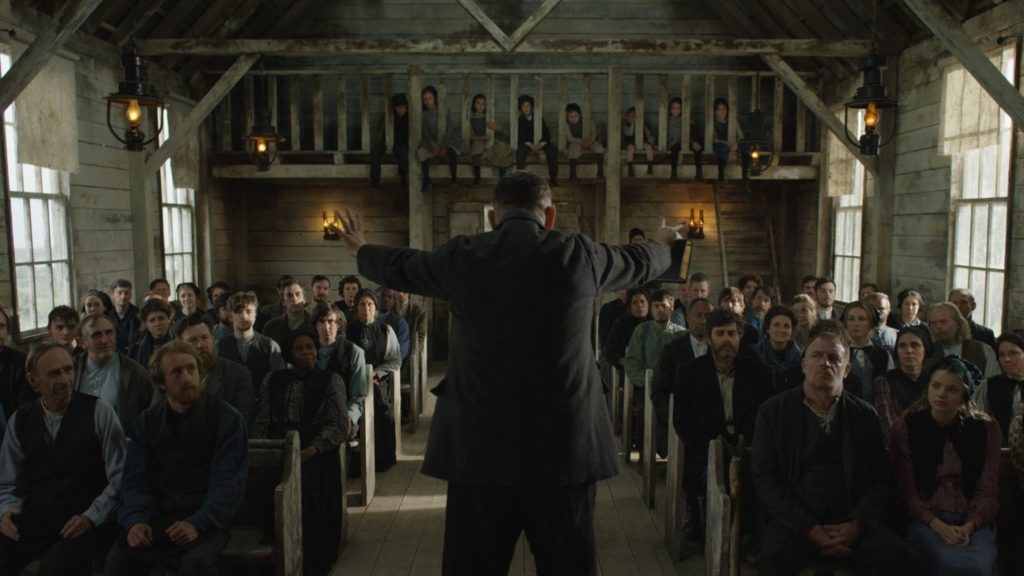
That’s already a lot of moving parts, and the film feels the need to complicate itself further by adding a couple more threads once Thomas has established himself in the island commune and started poking around after his sister. There’s a whole soap-opera subplot about Frank’s son, Jeremy (Bill Milner) and Quinn’s daughter Ffion* (Kristine Froseth) being in puppy-love and her getting knocked up; and then there’s the cult’s fracturing leadership, with Malcolm’s position as head honcho being contested by the harsher, crueller Quinn. At 130 minutes, Apostle isn’t short, but that’s not because it’s taking its time to build mood and atmosphere and dread, or anything silly like that. It’s dense with plot beats, enough of them that it neads at least two hours and change to negotiate them all.
Much like in The Raid 2, Evans stumbles off the starting block as a screenwriter, burdening the viewer with a lot of snarled complexity and details rather than giving them a straightforward hook to get invested in (Thomas is supposedly motivated by his devotion to his angelic sister, but we never get anything to show us why that connection is so deeply felt). And it doesn’t help that Evans doesn’t quite seem to have those details totally straight himself; parts of the setup flatly don’t make sense. There’s little justification for why Thomas would be either well-suited or well-positioned to act as a spy – surely a family wealthy enough to be worth ransoming in the first place would have the means to, say, hire a professional non-laudanum addict for this task. There’s one head-slapping moment early on, when Thomas introduces himself on arrival at the island using his real name. Even if the cult thinks that the male heir to the Richardson household is dead, even if they don’t know what he looks like, Malcolm knows from the start that there is a mole on the island; one would think that a man who shares a surname with the family he’s holding to ransom, who no-one else recognises from any prayer meetings, would stand out as a suspect out of like a dozen possible candidates. Speaking as someone who’s taken a stab at writing a novel, I speak from experience; this is the kind of problem you make for yourself when there’s an issue with your plot, and you try to solve it by adding more plot.
Once Apostle finds its groove, there’s a lot about it to like. For starters, it’s a very handsome film, that gets the benefit of some terrific sets and locations. The village of Erisden, in particular, is marvelously considered and specific. It was constructed by a team of carpenters led by production designer Tom Pearce over the course of 8 or 9 weeks, during the Welsh winter months, and that sense of organic damp and wind-worn textures informs every part of it; it feels persuasively like a space where people work and conduct daily life on the frontier of civilisation. (One aspect I really love is the idea that the buildings are constructed, in part, from the repurposed materials of the boats the settlers ran aground in, a detail that subtly helps to reinforce the sense of isolation and exile from the rest of the world. In a moment of deft symbolism, there’s an early sequence where the new arrivals, on approach to the village, see a cross at the top of a hill; as they crest the hill, they see that it’s not a cross, but the top of a ship’s mast.)
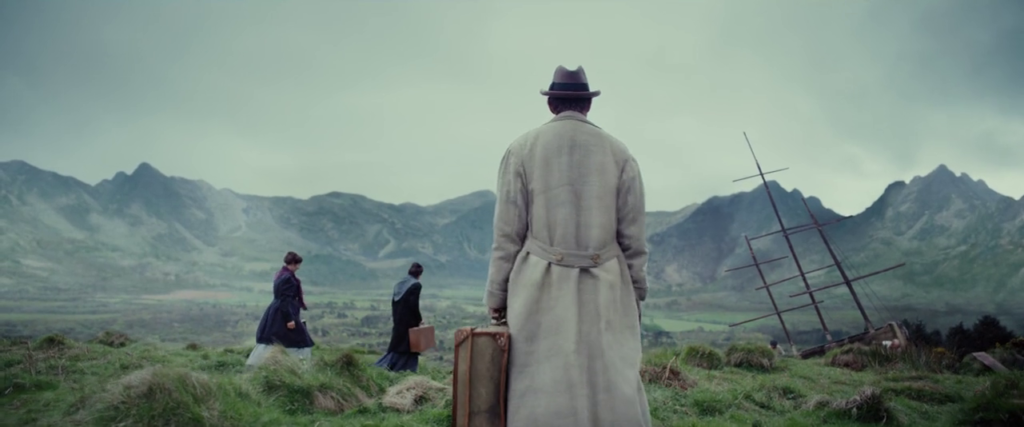
Matt Flannery remains an asset as Evans’s DP, making an asset of the overcast Welsh countryside (it was shot in Margam Park, a country estate on the coast just south of Port Talbot). Most of the film is cast in gloomy greys, browns, and dark greens, but is never lacking in clarity or detail, benefitting from unfussy but painterly compositions and steady, unhurried camera movement. Aria Prayogi and Fajar Yuskemal also return as composers, contributing a punishing score full of harsh, atonal strings and sudden blasts from infernal choirs (they often sound like they’re taking cues from Threnody for the Victims of Hiroshima.)
The filmmakers’ combined technical acumen comes together to create some seriously strong, memorable set-piece moments. Evans hasn’t lost any of his skill as a showman, crafting moments that stick with you for their intensity and their macabre grandeur. Some of these are potent individual images – the sight of Thomas during the Boxer Rebellion, having his back branded with a cross against the backdrop of a blazing field; a cliffside bursting open and depositing a gout of fire and blood into the sea, as though the island itself is a wounded, Protean organism; the “Heathen Chair” sequence, which finds a pleading Jeremy being strapped into a grotesque execution device, with which Quinn slowly drills a hole through his skull and into his brain.
The filmmakers’ combined technical acumen comes together to create some seriously strong, memorable set-piece moments.
Some of them are tension sequences – there’s a moment early on that brings in the recurring Evans motif of having a row of prisoners lined up on their knees, at the mercy of the arch-villain. Here, it’s Malcolm addressing a group of villagers (Thomas among them) who he suspects of being the mole, moving from one to the next, requiring them to quote from memory a passage from his Gospel. Or the sequence when Thomas is being chased through the tunnels beneath the village; boxed in from one side by Frank and from the other by Malcolm, he escapes by squeezing through a narrow ditch full of human blood – a moment that doesn’t quite equal the “hiding in the wall” bit from The Raid, but it’s not far off it.
And some of them are action beats – yes, Apostle couldn’t resist putting in a couple of brief fight scenes. The big one is the climactic struggle between Thomas and The Grinder (Sebastian McCheyne), a giant brute whose face is obscured by a helmet, and whose only vocalisations are wordless shrieks. They fight for control of the hand-cranked mechanism being used to grind up bodies as food for the goddess, both combatants repeatedly coming inches away from mutilation or worse. But even the smaller moments pack a punch, like the confrontation between Jeremy and Quinn after the latter’s murder of Ffion*; an ugly struggle for control of a knife that feels authentically scrappy and desperate. Apostle is Evans’s first collaboration with fight choreographer Jude Poyer, who would go on to work on Gangs of London and Havoc. He brings to the table a convincingly brutal, gritty, scrappy mode of combat that’s distinct from Evans’s martial-arts films.
So Apostle isn’t wanting for moments to hold our attention – trouble is, Evans still seems to condider creating these moments of maximum impact to be the film’s raison d’être, and in so doing forgoes any subtler effects. When the film is working, it’s exclusively working as an action-thriller in horror drag. It’s practically never effective as a folk horror film, for either the “folk” or “horror” components of that genre.

FOLK: Evans talks in his interview with The Verge about taking influence from fellow British director Ben Wheatley, particularly Kill List and A Field in England, both recent touchstones in the folk horror genre. They’re instructive comparison points, because both Kill List and A Field in England are very offbeat movies – both play around with genre and structure; both are shot and edited unconventionally; both have elements of ambiguity to their stories that persist long after the credits roll. They present the viewer with scenarios that feel enigmatic and irrational.
Apostle, by contrast, is dismayingly straightforward. There’s not a lot of mystery to the cult’s motives – indeed, the plot is set in motion by them needing funds to keep their operation afloat, which is just about the most quotidian possible motive for movie villains to have. The island goddess is definitely a supernatural being, but she abides by consistent and readily comprehensible logic, and Thomas hardly needs to look in order to discover the “secret” of how the cult have imprisoned and exploited her. There’s no sense that any ancient traditions or powers are being intruded upon by Thomas’s arrival; the cult is a brand new phenomenon, seemingly started only a few years ago, the precepts of its faith just a thinly veiled cover for Malcolm’s political cause. The imagery associated with the cult is a kind of mealy-mouthed combination of a Christian splinter group (think, like the Amish, or the Mennonites) with hymnal church services and printed, leather-bound volumes of scripture, and a vaguely pre-Christian, European paganism, Celtic or Druidic or something, with its invocation of Mother Goddesses, tree-worship and blood sacrifice.
The cult doesn’t seem to have been thought through to any extent beyond saying “y’know the sort of spooky village you’ve seen in a dozen other movies? Yeah, that.” To the extent that anything works about it at all, it’s thanks to Michael Sheen’s best-in-cast performance. He goes above the call of duty in his portrayal of Malcolm. He depicts a cult leader who’s passionate, confident, and beatific towards his followers, his charisma tempered by his seeming friendliness and approachability, his lilting Welsh accent ingratiating him to you even when he’s about to slit your throat. When he’s away from his subjects, Sheen depicts him as a conflicted, even sympathetic figure; he seems to be authentically committed to his political principles of agrarian collectivism and humanism, even if the religion he’s constructed around it is a sham. He’s privately worried, desperate to save what he’s built, but uncomfortable with the extremes he’s been driven to.
The cult doesn’t seem to have been thought through to any extent beyond saying “y’know the sort of spooky village you’ve seen in a dozen other movies? Yeah, that.”
HORROR: The character who doesn’t work, unfortunately, is our protagonist Thomas. This isn’t the fault of Dan Stevens, who plays the character the script asks of him. His scowling, unblinking, bright-blue eyes suggest a savage, calculating hunger; together with his stooped gait and clenched jaw, they make him look like a wary predator animal. At 6′ tall and obviously in good shape, Stevens is the most physically imposing specimen on the island as well. He’s less evocative of Sgt. Neil Howie than of The Man with No Name when he rolls into town.
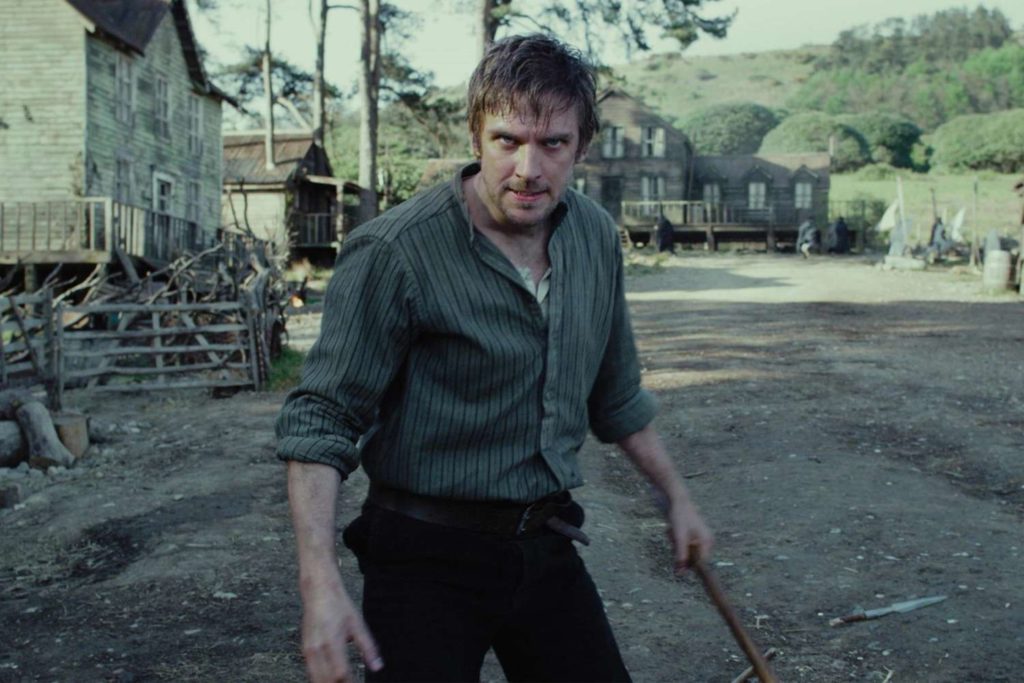
And like, that’s a choice you could make for this character, I guess. But I don’t think The Wicker Man would have been improved if Edward Woodward towered over Christopher Lee, or if his character was two steps ahead of the cultists at every turn. Thomas is simply too competent and too effectual a character for the atrocities around him to register as authentically dangerous to him. The choice to write him as a laudanum addict is one of the script’s most unproductive choices; he breaks his bottle of tincture in a fit of pique around midway through the film, and suffers no negative repercussions from doing so. Not only that, but he goes through the rest of the movie prevailing through near-superhuman tests of mental and physical endurance.
It’s certainly a gruesome movie, at least in terms of the vile things that get done to human bodies. But it always occurs as very mannered violence, very much staged for the audience’s edification. Evans mentions in his interview with Popmatters that the film’s themes of faith driving people to heinous acts of violence derive in part from the kind of ISIS execution videos that were rampant online around the time that the film was conceived. He likens the violence in Apostle to a “reflection” of the kinds of images he would see by accident on Twitter, much as Tobe Hooper’s The Texas Chain Saw Massacre reflected the images coming out of reportage on the Vietnam War.
If that was the goal, Apostle doesn’t achieve it like TCSM does. TCSM has a raw verisimilitude to its violence, a nihilistic naturalism, where the most unsettling thing about evil isn’t the pain it could inflict but the boundaries it can disregard; manifesting itself into our lives at any time and without warning. It’s a film that makes you feel less innocent for having watched it. Apostle’s violence is too tidy, too neatly staged, to suggest that more metaphysical sort of violation. Which is to say, it’s simply not scary.
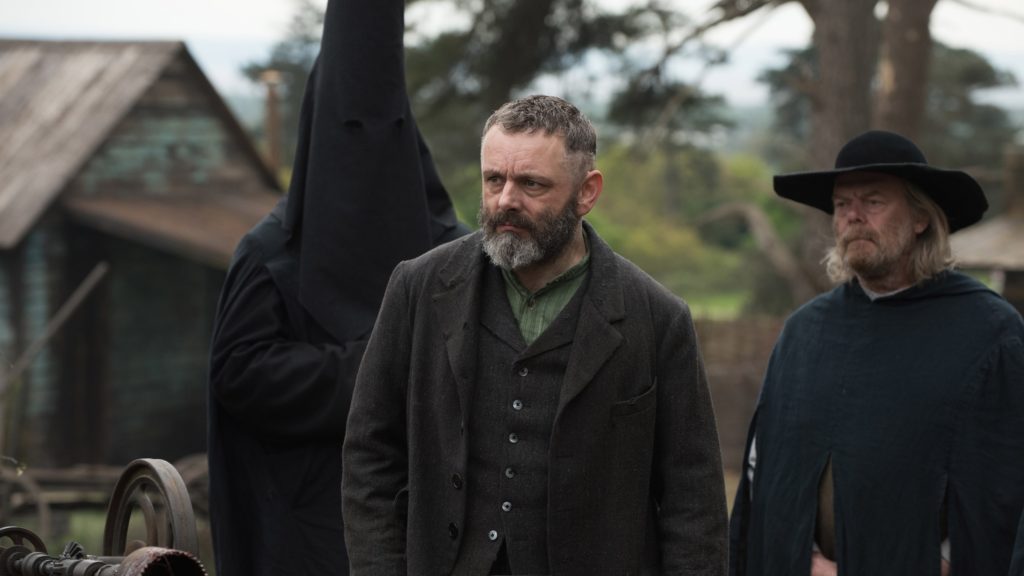
I came into this review planning to conclude on a note of muted positivity, but having organised my thoughts about it over the last couple of thousand words, I think I’ve actually come to conclude I don’t like Apostle very much. The more I’ve watched it and the more I’ve thought about it, the less I’ve liked it, and now I’ve reached a point where my feelings are mixed-to-negative; always a bummer when that happens. If not a good film, I think it’s a noble failure; a film that was entered into with enthusiasm and consideration, and a willingness to move outside its creator’s comfort zone. And I’m certainly glad that this idiosyncratic project exists, rather than Evans being recruited as a rank-and-file soldier in the Disney/Warner Bros. trench wars. So I don’t want to draw the conclusion that Evans should just stay in his lane and continue to be an “action guy” – “don’t try and stretch yourself and grow” is a shitty note of feedback to give to any artist; certainly to one whom you respect. But I think what we learn from Apostle as an exercise is that the requirements for action are not as close to the requirements of horror as they may first seem.
If not a good film, I think it’s a noble failure; a film that was entered into with enthusiasm and consideration, and a willingness to move outside its creator’s comfort zone.
The happy news is, that’s where Evans has been operating since Apostle came out. In 2020, he removed himself from cinema for a time to act as showrunner for Gangs of London – a prestige drama for Sky Atlantic that incorporates some epic action design of an order seldom seen on TV. I’ll be working through the show on The Goods over the coming months in anticipation of its third season, with particular attention to Episodes 1 and 5, directed by Evans, and featuring some of the most exciting sequences he’s yet directed. So, yeah, Evans hasn’t lost the taste for what he does best. I’m hoping we see that chutzpah in full view when Havoc hopefully, finally, releases in 2024.
*(That’s not a typo, BTW. It’s Welsh.)
- Review Series: Gareth Evans
Is It Good?
Nearly Good (4/8)
Andrew is a 2012 graduate of the University of Dundee, with an MA in English and Politics. He spent a lot of time at Uni watching decadently nerdy movies with his pals, and decided that would be his identity moving forward. He awards an extra point on The Goods ranking scale to any film featuring robots or martial arts. He also dabbles in writing fiction, which is assuredly lousy with robots and martial arts.

